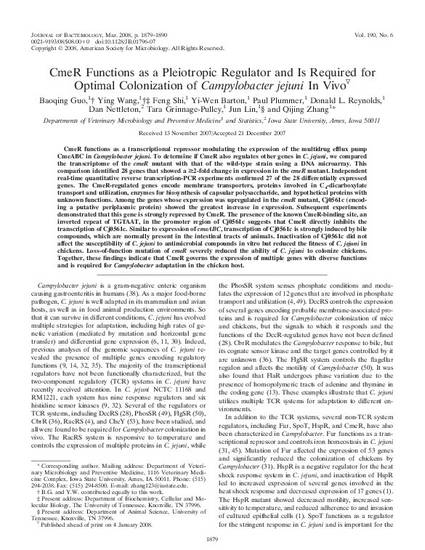
CmeR functions as a transcriptional repressor modulating the expression of the multidrug efflux pump CmeABC in Campylobacter jejuni. To determine if CmeR also regulates other genes in C. jejuni, we compared the transcriptome of thecmeR mutant with that of the wild-type strain using a DNA microarray. This comparison identified 28 genes that showed a ≥2-fold change in expression in thecmeR mutant. Independent real-time quantitative reverse transcription-PCR experiments confirmed 27 of the 28 differentially expressed genes. The CmeR-regulated genes encode membrane transporters, proteins involved in C4-dicarboxylate transport and utilization, enzymes for biosynthesis of capsular polysaccharide, and hypothetical proteins with unknown functions. Among the genes whose expression was upregulated in the cmeR mutant, Cj0561c (encoding a putative periplasmic protein) showed the greatest increase in expression. Subsequent experiments demonstrated that this gene is strongly repressed by CmeR. The presence of the known CmeR-binding site, an inverted repeat of TGTAAT, in the promoter region of Cj0561c suggests that CmeR directly inhibits the transcription of Cj0561c. Similar to expression of cmeABC, transcription of Cj0561c is strongly induced by bile compounds, which are normally present in the intestinal tracts of animals. Inactivation of Cj0561c did not affect the susceptibility of C. jejuni to antimicrobial compounds in vitro but reduced the fitness of C. jejuniin chickens. Loss-of-function mutation of cmeR severely reduced the ability of C. jejuni to colonize chickens. Together, these findings indicate that CmeR governs the expression of multiple genes with diverse functions and is required forCampylobacter adaptation in the chicken host.
Available at: http://works.bepress.com/qijing-zhang/1/

This article is from Journal of Bacteriology 190 (2008): 1879, doi:10.1128/JB.01796-07. Posted with permission.